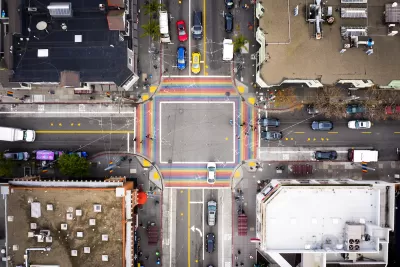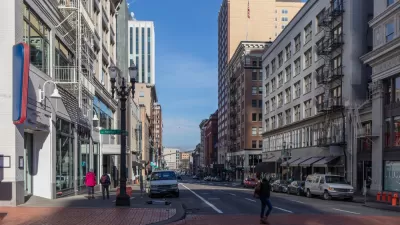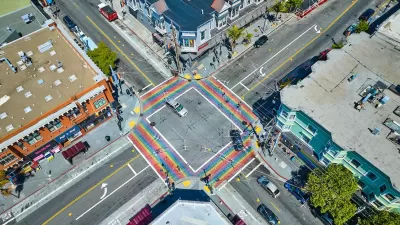The city wanted to eliminate traffic deaths by 2024. It didn’t.

“Despite a decade of work and a budget of hundreds of millions of dollars, San Francisco's 2014 Vision Zero initiative, aimed at eliminating traffic deaths in the city by 2024, never achieved its ambitious goal,” writes Noah Baustin in The San Francisco Standard. In 2023 so far, the city saw 25 people killed in traffic crashes—just six fewer than the number of deaths in 2014. In 2022, 39 people were killed in collisions.
Transportation advocate Luke Bornheimer told the Standard, “We have objectively failed.” The article details the city’s Vision Zero initiatives, which include bike lanes, improved pedestrian signals, and intersection ‘daylighting.’ “These initiatives all aim at a central goal: slow down traffic and prevent vehicles from colliding with pedestrians or bicyclists.”
The city is focusing on improvements on streets on its ‘high injury network.’ According to SFMTA Vision Zero Program Manager Uyen Ngo, “By the end of 2024, every remaining mile of the network is slated to receive crosswalk upgrades, pedestrian head starts before the light turns green, increased visibility around intersections, longer walk times and an advanced stop line for vehicles before the crosswalk.”
FULL STORY: San Francisco Spent Hundreds of Millions to End Traffic Deaths. People Are Still Dying

Planetizen Federal Action Tracker
A weekly monitor of how Trump’s orders and actions are impacting planners and planning in America.

Maui's Vacation Rental Debate Turns Ugly
Verbal attacks, misinformation campaigns and fistfights plague a high-stakes debate to convert thousands of vacation rentals into long-term housing.

San Francisco Suspends Traffic Calming Amidst Record Deaths
Citing “a challenging fiscal landscape,” the city will cease the program on the heels of 42 traffic deaths, including 24 pedestrians.

Amtrak Rolls Out New Orleans to Alabama “Mardi Gras” Train
The new service will operate morning and evening departures between Mobile and New Orleans.

The Subversive Car-Free Guide to Trump's Great American Road Trip
Car-free ways to access Chicagoland’s best tourist attractions.

San Antonio and Austin are Fusing Into one Massive Megaregion
The region spanning the two central Texas cities is growing fast, posing challenges for local infrastructure and water supplies.
Urban Design for Planners 1: Software Tools
This six-course series explores essential urban design concepts using open source software and equips planners with the tools they need to participate fully in the urban design process.
Planning for Universal Design
Learn the tools for implementing Universal Design in planning regulations.
Heyer Gruel & Associates PA
JM Goldson LLC
Custer County Colorado
City of Camden Redevelopment Agency
City of Astoria
Transportation Research & Education Center (TREC) at Portland State University
Jefferson Parish Government
Camden Redevelopment Agency
City of Claremont





























